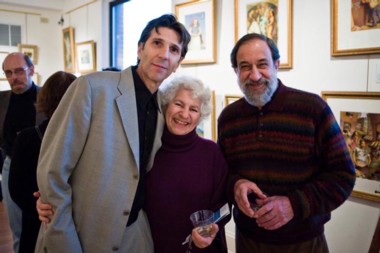Four years ago a world-class poet moved to Northampton, city of poets. Perhaps you read about it in the newspaper headlines. Or you would have if poetry was celebrated in the manner of other arts. But David Kherdian settled in quietly and went about the business of writing poems, as he had been doing for the previous 45 years, and now a new book, Living in Quiet: New and Selected Poems has gathered his life’s work in a beautifully designed edition with a woodcut by his wife, Nonny Hogrogian (more about her in a moment), on the cover. It has been published by Deerbrook Editions, a literary publishing house based in Maine.
Kherdian found his voice early. His first volume, On the Death of My Father, of which William Saroyan correctly said, “The title poem is one of the best lyrics in American poetry,” sets out one of the many themes that Kherdian explored in the more than 20 books that followed. What does it mean to be the American-born son of an Armenian immigrant father? How does one celebrate the family and heritage that is in their blood and lineage, while forging one’s own path and identity?
It is a lifelong struggle with no easy answers but the questioning is all:
…Because our relationship did not end
with your death, but continued in this way,
my way, on the page and right on through
to the heart of everything that matters,
the eternal matter of life on earth
and after death. (from “Our Time”)
They stare at each other
unable to communicate
aware of the abyss
on one side father Armenia
and on the other, son America
(from “The Father and the Son”)
Originally identified with the Beats and the San Francisco renaissance of the ’60s, Kherdian quickly went in his own direction, eschewing cliques and “isms” for a style that would serve him well and never waver. There is depth without the need for overt difficulty; there is personality without false humbleness or the flaunting of self, and Kherdian is never afraid to risk sentiment in his search for truth. These are poems hurled into being by the grace of love.
Which brings me back to Nonny Hogrogian, a two-time Caldecott-winning artist and Kherdian’s partner of 43 years and collaborator on many books for children. In The Nonny Poems, originally published in 1971, many of which are reprinted in the current volume, he charts their relationship from first meeting—to marriage—to a life in art lived together.
Hogrogian means earth carrier
In the language of our ancestors
And now Nonny takes up the tools
Of her new trade, putting the
Tools of art aside for the moment—
To actualize something new, that
Is as old as our people, whose
Beginnings precede Biblical time,
Knowing, as she has always known,
That to work is to enter mystery…
(from “Nonny Hogrogian”)
There is so much to recommend in this book. The boyhood poems of growing up in Racine, Wisc. take on some of the subject matter of U.S. Poet Laureate Phil Levine’s Detroit and its industrial landscape. But while Levine’s work is mostly fueled by anger at a succession of “stupid jobs,” Kherdian sees his home city as through a child’s eyes, reflecting back more quietly, with both horror and wonderment.
The poems Kherdian wrote during the nine years he and Hogrogian spent at a spiritual community in Oregon, studying the ideas of Gurdjieff, are also here, as are the poems he wrote after leaving the community. While there, he gardened, started a small press and tended to the animals. Kherdian’s poems appear simple on the surface—the sort of poem that should entice a wide audience—but they are far from commonplace, as he says about the act of watching two horses and a man plowing the earth for nurturance:
…as if one did not know that
the simple is not commonplace
as if one did not know
that the commonplace
has been nearly lost
and was being recaptured now
by the quiet, difficult
necessary toil of honest labor:
a man, two horses, the earth—
as if holiness for the moment
could be anything but this.
(from “Coming Into The Farm”)
And finally, there are poems which directly address the Armenian genocide. How could there not be? Kherdian’s biography of his mother, The Road from Home, was a Newbury Honor book, and to my mind the definitive exploration of that still under-reported period in history. The poems make the tragedy personal but leave us thankful that Kherdian is the one telling the tale.
This numbness has taken a lifetime
to lift. Now in your lowered graves,
I beseech you to look upon the
empty space I will fill once
we come to be joined again
because we were always one.
(from “Mother Father Poem”)
A 2012 recipient of the Armenian Star Award, Kherdian is widely recognized as one of the most important and distinctive voices in Armenian-American poetry over the last four decades. I am pleased he is still writing, and here among us in Northampton.•
David Kherdian reads from his work Aug. 23, 5 p.m., at Food for Thought Books in Amherst.
Richard Michelson is the current Poet Laureate of Northampton.



